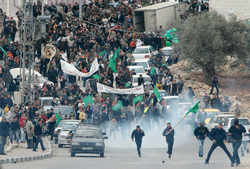A coalition of international human rights organizations and activists, including Amnesty International, has written to United Nations Secretary General Ban Ki-moon to urge a full investigation into alleged war crimes committed by both sides during the recent conflict between Israelis and Palestinians in Gaza and southern Israel. A United Nations inquiry into attacks on its own facilities and personnel during the conflict is underway, but human rights activists are calling for a broader investigation. “The U.N. investigation is not sufficient as a response to the grave violations that were committed during the conflict,” Malcolm Smart of Amnesty International told The Palestinian Centre for Human Rights in mid-March. “Hundreds of civilians were killed or injured and it is vital that the circumstances in which they were attacked are fully investigated.” Signatories to the letter include Nobel Peace Laureate Desmond Tutu and former U.N. High Commissioner for Human Rights Mary Robinson.
In a similar letter to European Union officials sent March 23 by Human Rights Watch, the international group alleged that war crimes had been committed by both sides, telling the Guardian newspaper that “members of Hamas, and other Palestinian militants, fired hundreds of rockets into southern Israel during the three-week war,” and that the missiles “were clearly aimed at civilian areas.” The rocket fire killed three Israeli civilians during the war. Hamas and Palestinian officials also stand accused, according to the Guardian, of launching “a crackdown against its perceived internal rivals, injuring and sometimes killing them in a wave of attacks.”
It is Israel’s actions during the war, however, that appear to be generating the most criticism. While thirteen Israelis died during the conflict, at least 1,400 Palestinians, mostly civilians, perished. Israeli and Palestinian civilians and soldiers, in eyewitness accounts leaked to the Israeli newspaper Haaretz and in a series of pieces for the Guardian, have alleged serious violations of the rules of civilized warfare by Israeli officials, including the use of human shields, the deliberate targeting of medical facilities and attacks on women and children. According to the Guardian, “some of the most dramatic testimony… came from three teenage brothers in the al-Attar family. They describe how they were taken from home at gunpoint, made to kneel in front of Israeli tanks to deter Hamas fighters from firing, and sent by Israeli soldiers into Palestinian houses to clear them. ‘They would make us go first so if any fighters shot at them the bullets would hit us, not them,’ 14-year-old Al’a al-Attar said.” United Nations officials have independently confirmed that such incidents took place.
One Israeli soldier, according to The New York Times, also said that extremist rabbis were telling Israeli soldiers that they were fighting a holy war, and that “their message was very clear: We are the Jewish people, we came to this land by a miracle. God brought us back to this land, and now we need to fight to expel the non-Jews who are interfering with our conquest of this holy land.”
Both Israeli and Palestinian officials have been quick to defend their actions during the conflict. Israeli Defense Minister Ehud Barak, according to The New York Times, said the allegations, even if true, are exceptions and that “The Israeli Army is the most moral in the world, and I know what I’m talking about because I know what took place in the former Yugoslavia, in Iraq.”Ahmed Yusuf, an adviser in Hamas foreign ministry has defended the actions of Palestinian soldiers: "They are heroes because they defend the Palestinian people," he told the Guardian. “We live under occupation and we have a legitimate right to defend ourselves. With only negotiations you will achieve nothing… if you dont keep your hands on the gun nobody will respect you."








